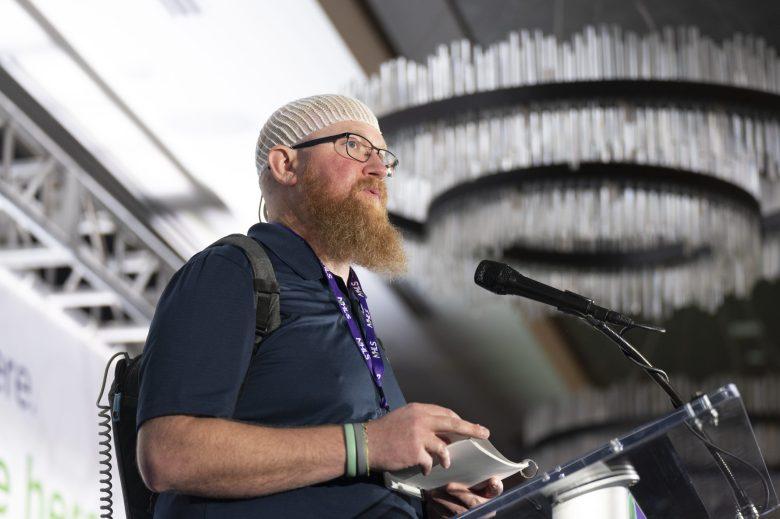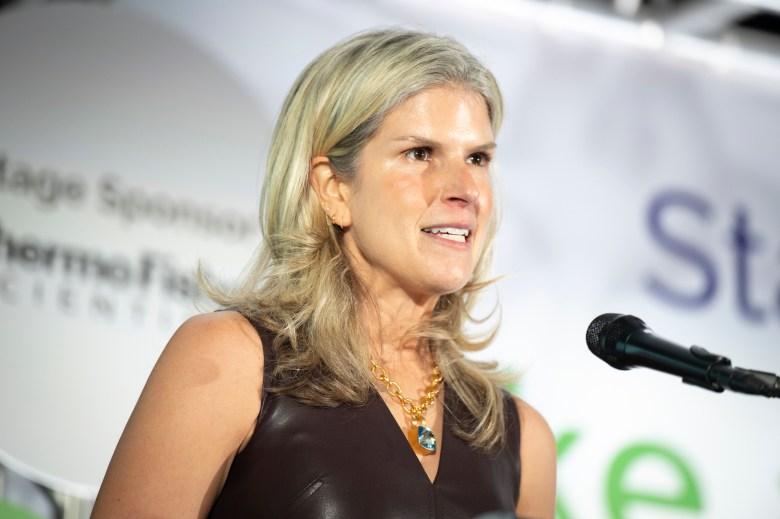
Taylor Gray wears Novocure’s Optune Gio while recounting his experience during the treatment of his glioblastoma during the NHLS Live Free Life Science 2025 event, at The Artisan at Tuscan Village, in Salem, N.H., on Nov. 12, 2025. (Credit: Daniel Sarch / Granite State News Collaborative)
Taylor Gray has tried to control his glioblastoma – a malignant brain tumor – with surgery, radiation and chemotherapy. After struggling to improve his quality of life with the treatments, his radiation oncologist introduced him to Optune Gio, a wearable, portable medical device created by Novocure, a European biotechnology company with its U.S. headquarters in Portsmouth. Through electric fields in a wearable cap, the device slows or stops glioblastoma cancer division. After using the device, Gray is currently tumor-free.
When the option to use Optune Gio was presented to him, Gray showed immediate interest as it was another way to continue his fight to be a devoted husband and a present father of two girls. Gray spoke of his experience at the Live Free Life Science 2025 event, hosted by the industry organization New Hampshire Life Sciences (NHLS) in Salem on Wednesday.
“When my fears start to build, I remind myself that all I can do is continue to fight,” Gray said. “My greatest hope is to enjoy all the little moments now and hope I can stick around long enough to witness the amazing humans my kids are already turning up to be.”
Novocure is one of the many companies in growing New Hampshire’s life sciences industry, which includes a broad cluster of businesses involved in a range of innovations, including in medical technology, pharmaceutical manufacturing and biotechnology. The industry contributes almost $3 billion, about 3%, to the state’s gross domestic product, with $4.3 billion in total sales in 2021, according to the Life Sciences Industry Assessment and Strategy published in 2023 by the N.H. Department of Business and Economic Affairs. NHLS President and CEO Andrea Hechavarria said the numbers were eye-opening, since the industry has existed in the shadow of Boston, one of the largest biotech hubs in the country.
“Oftentimes, you would see New Hampshire represented as an asterisk whenever they would do Greater Boston or the Greater Boston region,” Hechavarria said. “No one really ever pulled out specifically what is happening in New Hampshire alone.”

NHLS President and CEO Andrea Hechavarria speaks during the NHLS Live Free Life Science 2025 event, at The Artisan at Tuscan Village, in Salem, N.H., on Nov. 12, 2025. (Credit: Daniel Sarch / Granite State News Collaborative)
The assessment kick-started the founding of the NHLS, an association that aims to create growth and awareness of the life sciences industry in New Hampshire and to attract a larger workforce to the state. NHLS started with only two member companies in 2023 and now has over 50 participating members in just two years.
‘Punching above our weight’
Over the past few years, New Hampshire has seen significant growth in its life sciences industry. According to a report by the Biotechnology Innovation Organization and the Council of State Bioscience Associations, between 2019 and 2023 the number of establishments in the New Hampshire’s bioscience industry grew by 87.2% and employment increased by 27.9%, with New Hampshire’s total private sector growing by 22.7% and employment within it by 3.4%. Nationally, the growth was 35% and 14.7%.
Such growth is seen most clearly at Portsmouth-based Tenovi, a company working to improve remote patient monitoring devices. The Inc. Magazine included the firm on its 2025 list of the 5,000 fastest-growing private companies. It was No. 55 in the nation, first in New Hampshire and second in the greater Boston area.
“It’s proof of what’s possible in New Hampshire’s innovation ecosystem,” the company’s CEO and founder, Nizan Friedman, said in a press release supporting NHLS.
Gov. Kelly Ayotte also has focused her attention on the life sciences industry. In September, Ayotte and Hechavarria embarked on a trade mission trip to Canada, with many of the meetings focusing on life science. The hope is that New Hampshire can act as a gateway for U.S. expansion of Canadian biotech companies. At the Live Free Life Science 2025 event, Ayotte voiced her support for the industry.
“This is the sector where things are happening in New Hampshire, and we are punching way above our weight,” Ayotte said.

Gov. Kelly Ayotte speaks during the NHLS Live Free Life Science 2025 event, at The Artisan at Tuscan Village, in Salem, N.H., on Nov. 12, 2025. (Credit: Daniel Sarch / Granite State News Collaborative)
Workforce retention an issue
While the state’s tax structure – having no state income tax, sales tax or capital gains tax – is a factor in luring biotech businesses to set up shop in New Hampshire, its educational institutions are a driving force as well. There are specific biotech-related programs and significant research being offered and conducted on the campuses of the two largest institutions, Dartmouth College and the University of New Hampshire. There’s also the ReGen Valley Common Campus, an initiative that includes nine colleges and universities and industry partners. Through it, students can take courses at participating institutions as a means of helping to develop a sustainable pipeline into biofabrication and life science, said Matt Simon, director of the UNH Biotechnology Innovation Center and the ReGen Valley Common Campus.
Simon said the campus was developed to “ leverage the expertise at each institution to provide the best educational benefit for the workforce in New Hampshire that are interested in getting into life sciences.”
Other New Hampshire initiatives are looking to do the same thing. Simon pointed to Manchester CREATES, a collaboration between the Manchester School District and UNH Manchester that provides a paid summer training program for teachers to learn about STEM education. The Community College System of New Hampshire also has an apprenticeship program funded by the U.S. Department of Labor Employment and Training Administration.
Doug McConnell, co-founder and CEO of Safi Biotherapeutics in Cambridge, Mass. – a panelist at the NHLS event – also told the audience that the state can look beyond its borders as well.
“There’s a state below you and on either side of you that also has a lot of great institutions that will help solve the workforce needs in New Hampshire as this manufacturing industry grows,” he said.
Despite these efforts, workforce retention is still an issue. While proximity to Boston has fueled early growth, Hechavarria believes the state’s relatively unknown life sciences industry makes it a challenge to keep new talent. New Hampshire has also seen the cost of living continue to rise, with mortgage costs doubling since 2015 for a median-priced single family home. Hechavarria has acknowledged this as a problem and said NHLS is a supporting organization in the Business and Industry Association’s Housing Supply Coalition, which aims to address housing affordability in the state.
“I think those types of issues are really going to be important, and ones that we have to solve as a state to continue to develop our workforce across sectors, not just life sciences,” she said.
Meanwhile, Hechavarria hopes that,, with the newfound collaboration in the industry through NHLS, there continues to be an organized, concerted effort to keep the industry thriving.
“We have a real opportunity to excel and make New Hampshire a great destination for companies small and large,” she said.
These articles are being shared by partners in the Granite State News Collaborative. For more information visit collaborativenh.org.
These articles are being shared by partners in the Granite State News Collaborative.Don’t just read this. Share it with one person who doesn’t usually follow local news — that’s how we make an impact. For more information, visit collaborativenh.org.
